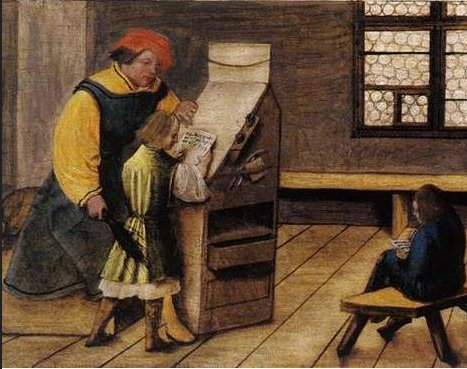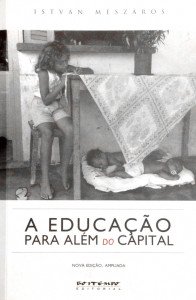Education beyond capital : Remedies cannot be just formal; they must be essential
Capital’s overall determinations deeply affect every single domain which has a bearing on education, and by no means only the formal educational institutions. The latter are closely integrated in the totality of the social processes. They cannot function properly, unless they are in tune with the comprehensive educational determinations of society as a whole.
by István Mészáros, originally published by Boitempo Editorial, 2008.*
Institutionalized education, especially in the last century and a half, served – on the whole – the purpose of not only supplying the know-how and the personnel needed by the capital system’s expanding productive machinery, but also of generating and transmitting a framework of values which legitimate the dominant interests, as if there could be no alternative whatsoever to running society in the form of either “internalized” (i.e. by the suitably “educated” individuals accepted) or ruthlessly enforced hierarchical structural domination and subordination. History itself had to be utterly misrepresented, and indeed often blatantly falsified, for the purpose. Fidel Castro, talking about the falsification of cuban history in the aftermath of the war of independence from Spanish colonialism, gives a striking example:
“¿Qué nos dijeron en la escuela? ¿Qué nos decían aquellos inescrupulosos libros de historia sobre los hechos? Nos decían que la potencia imperialista no era la potencia imperialista, sino que, lleno de generosidad, el gobierno de Estados Unidos, deseoso de darnos la liberdad, había intervenido en aquella guerra y que, como consecuencia de eso, éramos libres. Pero no éramos libres por cientos de miles de cubanos que murieron durante 30 años en los combates, no éramos libres por el gesto heroico de Carlos Manuel de Céspedes, el Padre de la Patria, que inició aquella lucha, que incluso prefirió que le fusiliaran al hijo antes de hacer una sola concesión; no éramos libres por el esfuerzo heroico de tantos cubanos, no éramos libres por la predica de Martí, no éramos libres por el esfuerzo heroico de Máximo Gómez, Calixto García y tanto aquellos próceres ilustres; no éramos libres por la sangre derramada por las veinte y tantas heridas de Antonio Maceio y su caída heroica en Punta Brava; éramos libres sencillamente porque Teodoro Roosevelt desembarcó con unos quantos rangers en Santiago de Cuba para combatir contra un ejército agotado y prácticamente vencído, o porque los acorazados americanos hundieron a los ‘cacharros’ de Cerveza frente a la bahia de Santiago de Cuba. Y esas monstruosas mentiras, esas increíbles falsedades eran las que se enseñaban en nuestras escuelas.”[2]
Misrepresentations of this kind are the normality when the stakes are really high, and particularly so when they are directly concerned with the rationalization and legitimation of the established social order as the supposedly unalterable “natural order”. History then must be re-written and propagandized in a most distorted form not only in the broadly diffused organs of political opinion formation, from mass newspapers to radio and television channels, but even in the supposedly objective academic theories. Marx offers a devastating characterization of how a vital question of capitalist history, known as the primitive or original accumulation of capital, is treated by the science of Political Economy. He writes in a powerful chapter of Capital:
“Primitive accumulation plays in Political Economy about the same part as original sin in theology. Adam bit the apple, and thereupon sin fell on the human race. Its origin is supposed to be explained when it is told as an anecdote about the past. In times long gone by there were two sorts of people; one, the diligent, intelligent and above all frugal élite; the other, lazy rascals, spending their substance, and more, in riotous living. … Thus it came to pass that the former sort accumulated wealth, and the latter sort finally had nothing to sell except their own skins. … Such insipid childishness is every day preached to us in the defence of property. … In actual history, it is a notorious fact that conquest, enslavement, robbery, murder, in short, force, play the greatest part. In the tender annals of political economy, the idyllic reigns from time immemorial. … As a matter of fact, the methods of primitive accumulation are anything but idyllic. … The proletariat created by the breaking-up of the bands of feudal retainers and by the forcible expropriation of the people from the soil, this ‘free’ [vogelfrei, i.e. ‘free as a bird’] proletariat could not possibly be absorbed by the nascent manufactures as fast as it was thrown upon the world. On the other hand, these men, suddenly dragged from their wonted mode of life, could not as suddenly adapt themselves to the discipline of their new condition. They were turned en masse into beggars, robbers and vagabonds, partly from inclination, in most cases from stress of circumstances. Hence at the end of the 15th and during the whole of the 16th centuries, throughout Western Europe a bloody legislation [was instituted] against vagabondage. The fathers of the present working-class were chastised for their enforced transformation into vagabonds and paupers. Legislation treated them as ‘voluntary’ criminals, and assumed that it depended on their own good will to go on working under the old conditions which in fact no longer existed. … Out of the poor fugitives, of whom Thomas More says that they were forced to thieve, ‘72,000 great and petty thieves were put to death’ in the reign of Henry VIII.”[3]
Naturally, not even the highly respected thinkers of the ruling class could adopt a stance dissenting from the most cruel way of subduing those who had to be kept under the strictest form of control in the interest of the established order. Not until the changing conditions of production itself modified the need for a – greatly enlarged – labour force under the expansionary conditions of the industrial revolution.
By the time John Locke was writing, there was a greater demand for profitably employable people than at the time of Henry VIII., even if still very far from what came about during the industrial revolution. Thus the significantly diminishing “surplus population” did not have to be physically exterminated as before. Nevertheless, it had to be treated in the most authoritarian fashion, rationalizing at the same time the commended brutality and inhumanity in the name high sounding morality. In this way, in the last decades of the 17th century, in conformity to capital’s standpoint of political economy at the time, the great idol of modern liberalism: John Locke — an absentee landowner in Somersetshire as well as a most generously paid Government official — preached the same “insipid childishness” as described by Marx. Locke insisted that the cause of “The growth of the poor … can be nothing else but the relaxation of discipline and corruption of manners; virtue and industry being as constant companions on one side as vice and idleness are on the other. The first step, therefore, towards the setting of the poor on work … ought to be a restraint of their debauchery by a strict execution of the laws provided against it [by Henry VIII. and others].”[4]
Receiving annually the near astronomical remuneration of around £1,500 for his services to Government (as a Commissioner at the Board of Trade: one of his several offices), Locke did not hesitate to praise the prospect of the poor earning “a penny per diem”,[5] i.e., a sum approximately 1,000 times lower than his own income from just one of his governmental offices. Not surprisingly, therefore, “The value of his estate at death — nearly £20,000, of which £12,000 was in cash — was comparable to that of a well-to-do London merchant.”[6] Quite an achievement for someone whose principal source of revenue was milking the — admittedly more than willing — state!
Moreover, being a true gentleman, with a very high stake to protect, he also wanted to regulate the movements of the poor through the draconian measure of passes, proposing: “That all men begging in maritime counties without passes, that are maimed or above fifty years of age, and all of any age so begging without passes in inland counties nowhere bordering on the sea, shall be sent to the next house of correction, there to be kept at hard labour for three years.”[7] And while the brutal laws of Henry VIII. and Edward VI. wanted to slice off only “half the ear” of the second offenders, our great liberal philosopher and state official — one of the leading figures of early English Enlightenment — suggested an improvement on such laws by solemnly recommending the loss of both ears, to be administered already to first offenders.[8]
At the same time, in his “Memorandum on the Reform of the Poor Law” Locke also proposed the institution of workhouses for the children of the poor from a very early age, arguing that: “The children of labouring people are an ordinary burden to the parish, and are usually maintained in idleness, so that their labour also is generally lost to the public till they are twelve or fourteen years old. The most effectual remedy for this that we are able to conceive, and which we therefore humbly propose, is, that, in the fore-mentioned new law to be enacted, it be further provided that working schools be set up in every parish, to which the children of all such as demand relief of the parish, above three and under fourteen years of age … shall be obliged to come.”[9]
Not a religious man himself, Locke’s chief concern was how to combine severe work discipline and religious indoctrination with the maximum of state and municipal financial frugality. He was arguing that “Another advantage also of bringing children thus to a working school is that by this means they may be obliged to come constantly to church every Sunday, along with their schoolmasters or dames, whereby they may be brought into some sense of religion; whereas ordinarily now, in their idle and loose way of breeding up, they are as utter strangers both to religion and morality as they are to industry.”[10]
Obviously, then, the measures that had to be applied to the “labouring poor” were radically different from those which the “men of enlightenment” considered suitable for themselves. In the end it all boiled down to naked power relations, enforced with utmost brutality and violence in the course of early capitalist developments, irrespective of how they were rationalized in the “tender annals of political economy”, in Marx’s words.
Naturally, the institutions of education had to be adapted as time went by, in accordance with the changing reproductive determinations of the capital system. In this way, utmost brutality and legally enforced violence as educational means – once not only unquestioningly accepted but even actively promoted by early enlightenment figures, like Locke himself, as we have just seen – had to be left behind. They were abandoned not because of humanitarian considerations, even if they were frequently rationalized in such terms, but because maintaining the machinery of strict enforcement proved to be economically wasteful or at least superfluous. And this was true not only about the formal institutions of education but also in some fields indirectly connected with educational ideas. To take only one significant example, the initial success of Robert Owen’s experiment was due not to the paternalistic humanitarianism of this enlightened capitalist, but to the relative productive advantage at first enjoyed by the industrial enterprise of his utopian community. For thanks to the reduction of the absurdly long working day prevailing as a general rule at the time, the Owenite approach to work resulted in a much greater intensity of productive achievement during the reduced hours. Once, however, similar practices were more broadly diffused, as they had to be under the rules of capitalist competition, his enterprise became doomed and went bankrupt, notwithstanding the undoubtedly advanced views of Robert Owen on educational matters.
Capital’s overall determinations deeply affect every single domain which has a bearing on education, and by no means only the formal educational institutions. The latter are closely integrated in the totality of the social processes. They cannot function properly, unless they are in tune with the comprehensive educational determinations of society as a whole.
Here the crucial question, under the rule of capital, is to secure the adoption of the objectively feasible reproductive aims of the system by the particular individuals as “their own ends”. In other words, in a truly comprehensive sense of the term education, this is a question of “internalizing” by the individuals – as indicated in the second paragraph of this section – the legitimacy of the station assigned to them in the social hierarchy, together with their “proper” expectations and the “right” forms of conduct more or less explicitly stipulated on that ground. So long as internalization can do its good work, for securing the overall reproductive parameters of the capital system, brutality and violence can be pushed into the background (though by no means permanently abandoned) as wasteful modalities of value-enforcement, as indeed happened in the course of modern capitalistic developments. Only in periods of acute crisis is the arsenal of brutality and violence brought back to prominence for the purpose of value-enforcement, as the tragedy of many thousands of desaparecidos in Chile and in Argentina demonstrated it again in recent times.
To be sure, the formal institutions of education are an important part of the overall system of internalization. But only a part. Whether or not the individuals are participating – for a shorter or longer, but always rather limited, number of years – in the formal educational institutions, they must be induced into the active (or more or less resigned) acceptance of the dominant reproductive orienting principles of society itself, as befits their station in the social order, and in accordance with the reproductive tasks assigned to them. Under the conditions of slavery or feudal serfdom this is, of course, a very different problem from what must prevail under capitalism, even when the working individuals are formally not at all, or very little, educated in the formal sense of the term. Nevertheless, by internalizing the ubiquitous outside pressures, they must adopt the overall perspectives of commodity society as the individualistically unquestionable limits of their own aspirations. Only the most conscious collective action can extricate them from this paralyzing predicament.
Viewed in this perspective, it becomes very clear that formal education is not the primary ideological cementing force of the capital system; nor is it capable of providing, on its own, a radical emancipatory alternative to it. A main function of formal education in our societies is to produce as much conformity or “consensus” as it is capable of within and through its own institutionalized and legally sanctioned limits. To expect from commodity society the active enactment – or even the mere toleration – of a mandate given to its formal educational institutions which would invite them to fully embrace the great historic task of our time: that is, the task of breaking capital’s logic in the interest of human survival, would be a monumental miracle. This is why remedies, also in the educational field, “cannot be formal; they must be essential”. In other words, they must embrace the totality of educational practices of established society.
Formal educational remedies, even some major ones, and even when they are enshrined in law, can be completely reversed, so long as capital’s logic remains intact as the orienting framework of society. In Britain the main debates on education, for several decades, centered on the question of “Comprehensive Schools”, to be instituted in place of the long established elitistic school system. In the course of those debates the British Labour Party not only adopted as a key electoral program the general strategy of replacing the former privileged system of learning by the Comprehensive Schools, but in fact also legally codified that policy after successfully forming the government, although even then it did not dare to touch the most privileged sector of education, the “Public Schools”.[11] Today, however, the British Government of “New Labour” is bent upon dismantling the comprehensive school system, by not only refurbishing the old elitistic educational institutions but also by instituting a new variety of middle-class-favouring “academies” in addition to them, despite all criticism even among its own supporters about the establishment of a “two-tier system” in the field, just like the two-tier-system is in the course of being established and reinforced by the government in the British “National Health Service”.
Thus, one cannot escape even from the “formidable prison” of the established school system (condemned in these words by José Martí) by simply reforming it on its own. For what was there before such reforms will surely be restored sooner or later, due to the utter failure to challenge by any isolated institutional change the self-asserting overall logic of capital itself. What needs to be confronted and fundamentally altered is the entire system of internalization, with all of its visible and hidden dimensions. Breaking capital’s logic in the field of education is therefore synonymous with replacing the ubiquitous and deeply entrenched forms of mystifying internalization by a comprehensive positive alternative.
This is the question we must now turn to.
* copyright © István Mészáros, publications copyright © Boitempo Editorial, 2005, 2008,
Author: István Mészáros, Preface: Emir Sader, Front Flap: Gaudêncio Frigotto, Translation: Isa Tavares, Original Title: Education Beyond Capital.
[1] See note 2.
[2] Fidel Castro, José Martí: El autor intelectual, Editora Política, La Habana, 1983, p. 162. See also p. 150 of the same volume.
[3] Marx, Capital, vol. 1, pp. 713-14 & 734-36.
[4] Locke, “Memorandum on the Reform of the Poor Law”, in H.R. Fox Bourne, The Life of John Locke, King, London, 1876, Vol. 2, p.378.
[5] Ibid., p. 383.
[6] Neal Wood, The Politics of Locke’s Philosophy, University of California Press, Berkeley, 1983, p.26.
[7] Locke, `Memorandum on the Reform of the Poor Law’, Op.cit., p.380.
[8] Ibid.
[9] Ibid., p. 383.
[10] Ibid., pp. 384-85.
[11] “Public” in this context means private in Britain, referring to exorbitant fee-paying schools.
István Mészáros was born in Budapest, Hungary, in 1930. He graduated in philosophy at the University of Budapest, where he was György Lukács’ assistant. He is known as one of the main contemporary Marxist intellectuals and is internationally awarded for his work.







great points altogether, you just received a logo new reader.
What would you recommend about your submit that you simply made some
days ago? Any positive?